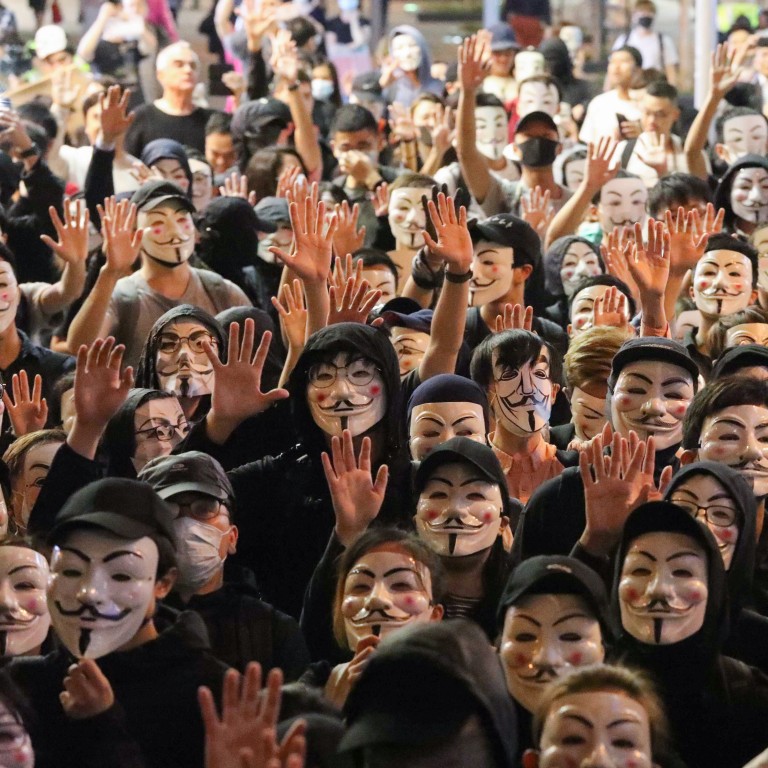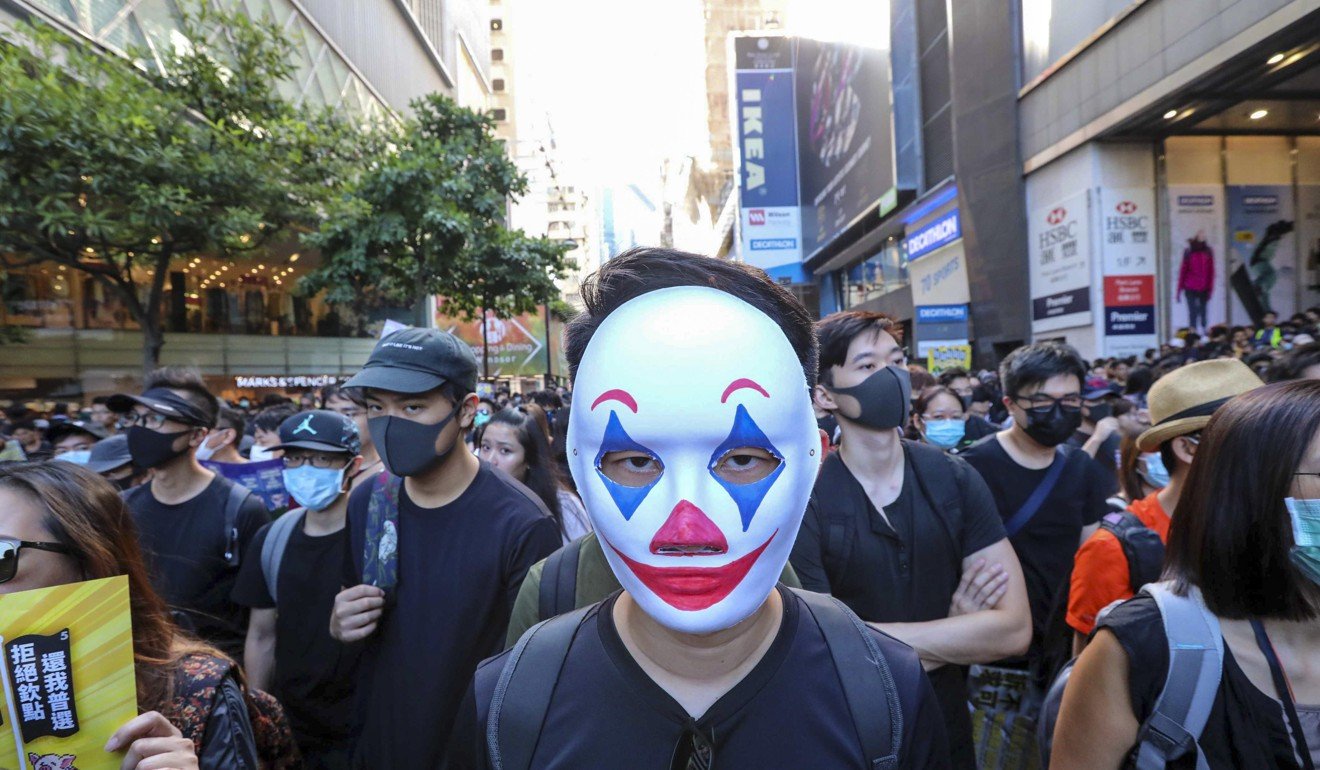
Anti-mask law to quell Hong Kong protests ruled unconstitutional by High Court
- Judges find government’s use of emergency legislation for mask ban ‘incompatible with the Basic Law’
- Mainland Chinese legal experts float possibility of another legal interpretation by Beijing
A Hong Kong court has ruled in favour of pan-democrats in declaring the government’s mask ban unconstitutional in a decision that forced police to halt law enforcement while legal experts in mainland China floated the possibility of another legal interpretation by Beijing.
Two High Court judges on Monday ruled that the emergency legislation that brought the ban on face coverings in public places into effect last month was “incompatible with the Basic Law” when used in times of public danger as seen in the present case. They also found the new law had imposed invalid restrictions on fundamental rights and freedoms.
The ruling by justices Anderson Chow Ka-ming and Godfrey Lam Wan-ho, in favour of the 25 pan-democrats who applied for judicial review, dealt a blow to the beleaguered city government. Police announced they would stop enforcing the ban for now, while prosecutors sought adjournment “to consider the situation”.
Legal experts were divided, some calling the judgment an important recognition of Hong Kong’s constitutional framework, while those on the mainland expressed concerns that the court might have sent the wrong signal to the radical protesters, floating the idea of Beijing interpreting the Basic Law again.

The judges will hear further submissions on Wednesday morning to decide the appropriate relief and costs.
The high-profile constitutional challenge centred on the colonial-era Emergency Regulations Ordinance and its derivative, the Prohibition on Face Covering Regulation, introduced by the government on the grounds of “public danger” in a bid to quell a wave of protests sparked nearly six months ago by the now-withdrawn extradition bill.
In a 106-page ruling handed down on Monday afternoon, the judges made clear it was not their judgment that an anti-mask law was, in general, objectionable or unconstitutional.
The judges also accepted that the government’s present ban was rationally connected to its aim of eliminating the emboldening effect of wearing masks and facilitating law enforcement, investigation and prosecution.
But they sided with the applicants in finding that the ordinance had effectively given the chief executive “the widest possible” powers to make laws with no limit on the subject matter, whenever desirable in times of public danger that could mean a wide range of scenarios, leaving the legislature with a diminished role.
“The need for an urgent response is no justification for departing from or impugning the constitutional scheme,” the judges wrote. “We believe [the ordinance] is not compatible with the constitutional order laid down by the Basic Law.”
The judges also found that the regulation had effectively imposed “a near-blanket prohibition” across unlawful assemblies, peaceful public meetings and processions where participants could have “perfectly legitimate reasons for not wishing to be identified or seen to be supporting [certain] causes”.
And in empowering any police officer to remove any kind of facial covering so long as they reasonably believe it likely to prevent identification, the regulation “represents a more serious inroad into protected rights than is reasonably necessary”, the judges concluded.
Mask ban unconstitutional say lawmakers, as they ask court to overturn law
“The restriction imposed by the [regulation] is … not to be trivialised as a minor inhibition on mask-wearing during demonstrations but, depending on the context, can have a significant impact on the freedom of expression in peaceful public meetings and processions,” they continued.
“We consider it to be clear that the measure adopted … exceeds what is reasonably necessary to achieve the aim of law enforcement, investigation and prosecution of violent protesters even in the prevailing turbulent circumstances in Hong Kong.”
But the judges left open the question of whether the ordinance is constitutional when used in times of emergency.
As of Thursday, some 632 people had been arrested for violating the regulation, according to police statistics obtained by the Post.
Chief Secretary Matthew Cheung Kin-chung said the government was studying the court ruling.
“The judgment today is not the end of the judicial process,” Secretary for Security John Lee Ka-chiu said. He declined to comment on whether he should bear any responsibility for not ensuring that the anti-mask law was legally watertight.
Former lawmaker “Long Hair” Leung Kwok-hung said his legal challenge exposed Chief Executive Carrie Lam Cheng Yuet-ngor’s abuse of power.
Hong Kong mask law enacted to ‘save as many young people as possible’
“I don’t want to comment on whether I have obtained victory or the government had been defeated,” he told reporters outside court. “All I have in mind is the people surrounded by police.”
Another applicant, legal sector lawmaker Dennis Kwok, urged the authorities not to appeal against the ruling and called on prosecutors to withdraw charges.
The regulation barred anyone from wearing “facial coverings” during public assemblies that were “likely to prevent identification”, with those convicted facing up to one year in jail and a HK$25,000 (US$3,187) fine.
It also gave police officers the power to require a person to remove his or her mask in a public place. Those failing to comply would have their masks removed by officers under an offence carrying a maximum prison sentence of six months and a fine of HK$10,000.
The controversial move sparked six constitutional challenges, including the present two, with the remaining four applicants directed to await the outcome of these proceedings.
At Kwun Tong Court, the first two people charged over the ban saw their cases put on hold after Senior Public Prosecutor Ivan Cheung Cheuk-kan asked for time to “consider the situation”. Acting principal magistrate Ivy Chui Yee-mei granted the application, adjourning the case to January 17.
Senior Superintendent Li Kwai-wah of the Organised Crime and Triad Bureau said the force would stop using the anti-mask law to arrest people in light of the ruling. He said that there had only been three cases in which officers made arrests solely on suspicion of violating the ban since it came into effect on October 5.
“Only one had been prosecuted and the case is still pending court hearing. We shall discuss with the Department of Justice what to do,” Li said.
Simon Young Ngai-man, law scholar at the University of Hong Kong, said the judgment had affirmed the importance of the separation of powers and fundamental freedoms in the city, and helped restore the authority of the Legislative Council as the primary lawmaking institution under the Basic Law.
In rare move, two judges appointed to hear legal bids against mask ban
“It’s an important victory for the recognition of separate legislative power after 1997,” Young said. “In the current political climate, it is of vital importance to reaffirm Legco’s authority, as it should be the central political institution to debate and mediate the conflicting interests in society.”
Ronny Tong Ka-wah SC, a member of the Executive Council, the government’s top advisory body, said the court had delivered “a very important judgment on constitutional order in Hong Kong”, but it was debatable whether the ordinance had indeed conferred too much power upon the chief executive, and whether the Chief Executive in Council had bypassed the legislature by invoking it.
Some mainland legal specialists said the court’s ruling could send the wrong signal to radicals and deal a blow to the government’s efforts to stop the violence. Whether Beijing would step in could rest on the outcome of a likely appeal by the government, they said.
“One option is for the National People’s Congress to issue an interpretation of the Basic Law. It could help clear the confusion and safeguard Hong Kong’s legal system,” Nankai University law professor Li Xiaobing said.
“But it also has to take into account whether such an interpretation would be accepted by Hong Kong’s legal community.
“Whether it will prompt the NPC to interpret the Basic Law would hinge on the ensuing legal proceedings, including the outcome of the [expected] appeal at the Court of Final Appeal.”
Beihang University law professor Tian Feilong noted that the ruling was not final and the government could still appeal. But he said the High Court’s decision did not reassure critics on the mainland who had already questioned the court’s lenient bail conditions for suspects arrested during the unrest.
“The judgment could prompt the NPC Standing Committee to initiate the interpretation process to supervise and guide Hong Kong courts in correctly understanding [the relationship] between the Basic Law and the Emergency Regulations Ordinance,” Tian said.
Meanwhile, Hu Xijin, editor-in-chief of Global Times, a nationalistic tabloid under People’s Daily, said that Monday’s ruling would demoralise the police force and encourage public sympathy towards hard-core radicals.
“Many people will see the ruling as the High Court’s accommodation of everything committed by these masked rioters,” Hu wrote in a Weibo post.
Additional reporting by Echo Xie

